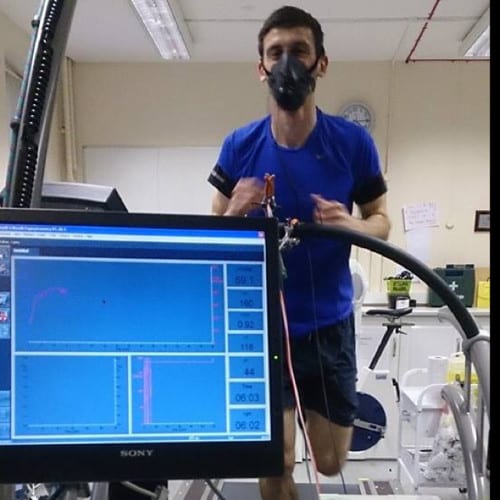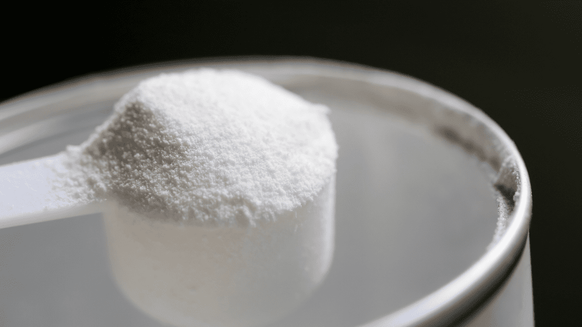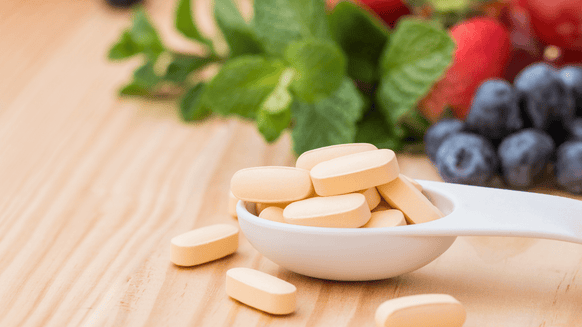Biotin is an essential vitamin that makes up part of a complex group of vitamins, known as the B vitamins.
The main role of these vitamins is to help the body with the conversion of food into usable energy, something which is extremely vital for our everyday functions, especially to support an active lifestyle and training routine.
What Is Biotin?
As already mentioned, biotin is a part of the group of B vitamins. It is an important component of enzymes within the body that break down certain substances such as carbohydrates, proteins and fats.
Biotin can be found naturally in some foods, and whilst we receive most of the biotin that we require through our diets, it can be a convenient and cost-effective solution to supplement in order to be sure you’re getting enough to gain the desired health benefits.

Biotin Health Benefits
There are many benefits which biotin has to offer, many of which are actually to do with physical appearance, making it a popular addition to a beauty regime, as well as your training routine. These benefits include:
Hair Growth
There is strong evidence to suggest that biotin has a great positive effect on hair growth and similarly, that biotin deficiency can lead to hair loss. As such, many manufacturers of hair products are now including biotin in their formulas to combat hair loss.
Strengthens Nails
Similar to the way in which biotin has been linked with strengthening hair, there have also been studies that have shown it also improves the health of your nails. This is because it helps to thicken the nail cuticles which can help to prevent breakages.
Improves Skin
Biotin has also been linked with improving the overall appearance of your skin, as well as certain skin rashes and conditions, such as acne. Biotin, as well as other B vitamins, plays a key role in our hormonal systems, which can be a trigger for conditions such as acne.

Helps Build and Repair Muscles
B vitamins are required in order to rebuild muscle tissue when it is broken down, i.e. after intense exercise. This makes it vital when it comes to building muscle.
Helps Blood Sugar Levels
One particular study has found that biotin can help to lower blood glucose levels when paired with another vitamin, chromium.
Supports Your Metabolism
As biotin and other B vitamins are used for the conversion of food into usable energy, it is vital for a healthy and effective immune system. Biotin helps to convert glucose from carbohydrate sources to the body’s preferred source of energy, ATP, or glycogen if it is being stored.

Biotin Daily Dosage
As reported by the National Academy of Science’s Institute of Medicine, the daily recommended intake of biotin is as follows:
- 5 micrograms daily for infants
- 12–20 micrograms daily for children ages 4–13
- 25 micrograms for adolescents
- 30 micrograms for male and female adults over 19
- 30 milligrams for pregnant women and 35 milligrams for women who are breastfeeding
Biotin Deficiency
Plainly speaking, biotin deficiency is quite rare, as we usually consume an optimal dosage of it through our regular diets.
However, some of the symptoms of biotin deficiency that are worth making a note of are as follows:
Dry skin - Hair loss
- Brittle hair
- Fatigue
- Mood swings
- Muscle aches
- Muscle cramps
If you believe you may be deficient in biotin then it is best to consult your doctor, who will advise you on the best procedure to take.
Food Sources of Biotin
As previously mentioned, biotin can be found in many food sources. Some examples include:
- Eggs (yolk)
- Liver
- Nuts
- Soy
- Wholegrains
- Bananas
- Mushrooms
- Cauliflower
- Avocado
- Salmon
- Raspberries

Biotin Side Effects
Biotin is deemed safe for consumption when taken orally and in appropriate doses, as previously outlined.
It is worth noting that you should probably consult with your doctor before taking any form of supplement, or if you believe that you may be deficient in biotin or any other vitamin.
Take Home Message
Biotin is an essential vitamin which helps the body carry out important processes and functions. Supplementing with biotin can be a great way to make sure you’re always topped up in a convenient and cost-effective way.
If you have any of the symptoms of biotin deficiency listed above, do not hesitate to contact your doctor who will recommend to you how to proceed.

[1] DrAxe (2015) Biotin benefits: Thicken hair, nails and beautify skin – Dr. Axe. Available at: https://draxe.com/biotin-benefits/ (Accessed: 31 August 2016). [2] (No Date) Available at: http://www.nal.usda.gov/fnic/DRI/DRI_Thiamin/374-389_150.pdf (Accessed: 31 August 2016).
[3] State, O. (2016) Biotin. Available at: http://lpi.oregonstate.edu/mic/vitamins/biotin (Accessed: 31 August 2016).
[4] Said, H.M. (2002) ‘Biotin: The forgotten vitamin’, The American Journal of Clinical Nutrition, 75(2), pp. 179–180.
[5] pmhdev (2016) ‘Biotin (oral route) – national library of medicine – PubMed health’, .
[6] Pubchem (no date) C10H16N2O3S. Available at: http://pubchem.ncbi.nlm.nih.gov/compound/biotin#section=Prescription-Drug-Products (Accessed: 31 August 2016).
[7] J, C. (2005) The benefits of Biotin. Available at: http://www.healthline.com/health/the-benefits-of-biotin#CosmeticClaims4 (Accessed: 31 August 2016).
[8] Báez-Saldaña, A., Zendejas-Ruiz, I., Revilla-Monsalve, C., Islas-Andrade, S., Cárdenas, A., Rojas-Ochoa, A., Vilches, A. and Fernandez-Mejia, C. (2004) ‘Effects of biotin on pyruvate carboxylase, acetyl-coA carboxylase, propionyl-coA carboxylase, and markers for glucose and lipid homeostasis in type 2 diabetic patients and nondiabetic subjects’, The American journal of clinical nutrition., 79(2), pp. 238–43.
[9] Masaru MAEBASHI, Yoshio MAKINO, Yuji FURUKAWA, Kosaku OHINATA, Shuichi KIMURA and Takao SATO (1993) ‘Therapeutic evaluation of the effect of Biotin on Hyperglycemia in patients with non-insulin dependent diabetes Mellitus’, J. Clin. Biochem. Nutr., 14(3), pp. 211–218. doi: 10.3164/jcbn.14.211.
[10] BIOTIN: Uses, side effects, interactions and warnings (2005) Available at: http://www.webmd.com/vitamins-supplements/ingredientmono-313-biotin.aspx?activeingredientid=313& (Accessed: 31 August 2016).[/su_spoiler]







